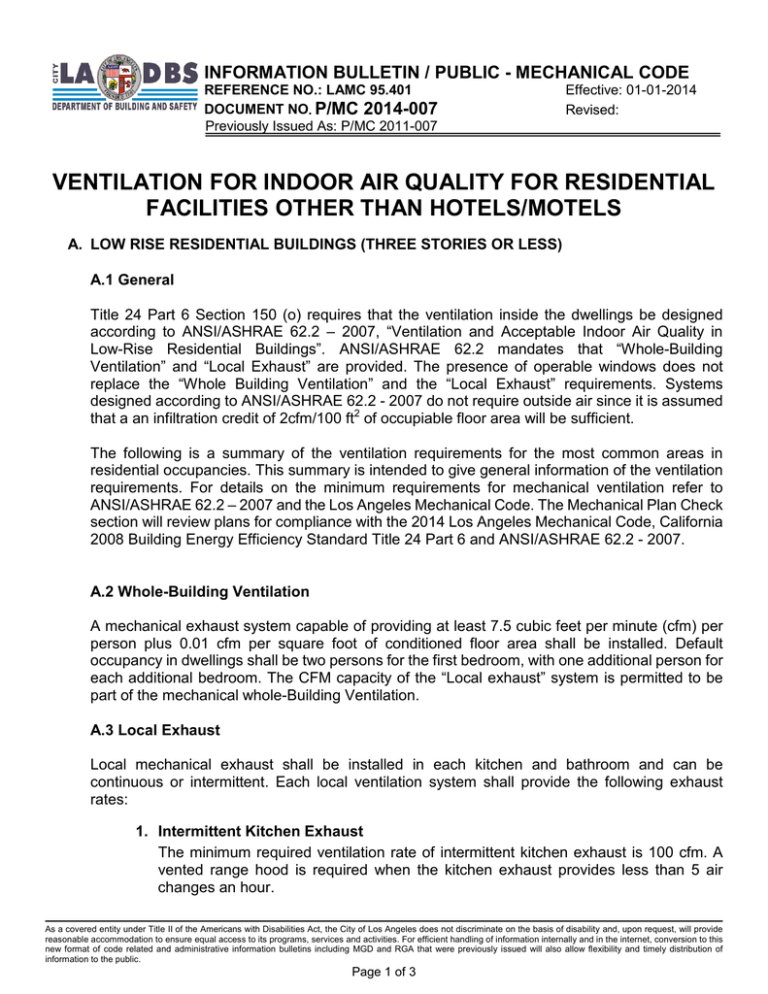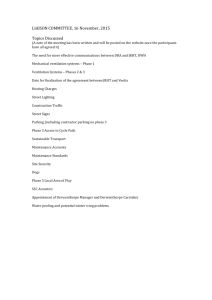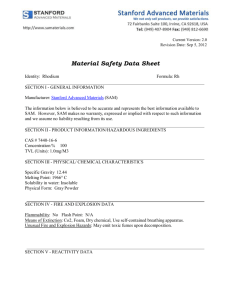Ventilation for Indoor Air Quality for Residential Facilities
advertisement

INFORMATION BULLETIN / PUBLIC - MECHANICAL CODE REFERENCE NO.: LAMC 95.401 DOCUMENT NO. P/MC 2014-007 Previously Issued As: P/MC 2011-007 Effective: 01-01-2014 Revised: VENTILATION FOR INDOOR AIR QUALITY FOR RESIDENTIAL FACILITIES OTHER THAN HOTELS/MOTELS A. LOW RISE RESIDENTIAL BUILDINGS (THREE STORIES OR LESS) A.1 General Title 24 Part 6 Section 150 (o) requires that the ventilation inside the dwellings be designed according to ANSI/ASHRAE 62.2 – 2007, “Ventilation and Acceptable Indoor Air Quality in Low-Rise Residential Buildings”. ANSI/ASHRAE 62.2 mandates that “Whole-Building Ventilation” and “Local Exhaust” are provided. The presence of operable windows does not replace the “Whole Building Ventilation” and the “Local Exhaust” requirements. Systems designed according to ANSI/ASHRAE 62.2 - 2007 do not require outside air since it is assumed that a an infiltration credit of 2cfm/100 ft2 of occupiable floor area will be sufficient. The following is a summary of the ventilation requirements for the most common areas in residential occupancies. This summary is intended to give general information of the ventilation requirements. For details on the minimum requirements for mechanical ventilation refer to ANSI/ASHRAE 62.2 – 2007 and the Los Angeles Mechanical Code. The Mechanical Plan Check section will review plans for compliance with the 2014 Los Angeles Mechanical Code, California 2008 Building Energy Efficiency Standard Title 24 Part 6 and ANSI/ASHRAE 62.2 - 2007. A.2 Whole-Building Ventilation A mechanical exhaust system capable of providing at least 7.5 cubic feet per minute (cfm) per person plus 0.01 cfm per square foot of conditioned floor area shall be installed. Default occupancy in dwellings shall be two persons for the first bedroom, with one additional person for each additional bedroom. The CFM capacity of the “Local exhaust” system is permitted to be part of the mechanical whole-Building Ventilation. A.3 Local Exhaust Local mechanical exhaust shall be installed in each kitchen and bathroom and can be continuous or intermittent. Each local ventilation system shall provide the following exhaust rates: 1. Intermittent Kitchen Exhaust The minimum required ventilation rate of intermittent kitchen exhaust is 100 cfm. A vented range hood is required when the kitchen exhaust provides less than 5 air changes an hour. As a covered entity under Title II of the Americans with Disabilities Act, the City of Los Angeles does not discriminate on the basis of disability and, upon request, will provide reasonable accommodation to ensure equal access to its programs, services and activities. For efficient handling of information internally and in the internet, conversion to this new format of code related and administrative information bulletins including MGD and RGA that were previously issued will also allow flexibility and timely distribution of information to the public. Page 1 of 3 P/MC 2014-007 2. Continuous Mechanical Exhaust A minimum 5 air changes per hour shall be provided based of the kitchen volume. 3. Intermittent bathroom Exhaust The minimum required exhaust rate is 50 cfm. 4. Continuous Bathroom Exhaust The minimum required exhaust rate is 20 cfm. B. HIGH-RISE RESIDENTIAL BUILDINGS (FOUR OR MORE HABITABLE STORIES) The ventilation requirements for residential buildings with four or more habitable stories can be met by providing: 1. Natural ventilation as described in ASHRAE 62.1; or 2. Mechanical ventilation based on the “Ventilation Rate Procedure” as outlined in ASHRAE 62. When the “Ventilation Rate Procedure” is used, any deviation from the requirements of this method shall only be allowed when engineering analysis using the Indoor Air Quality procedure is used to demonstrate that the indoor air quality is the same or better than the air quality achieved by the “Ventilation Rate Procedure” B.1 Natural Ventilation Naturally ventilated spaces are permitted. Naturally ventilated spaces shall be permanently opened by way of operable wall openings directly to the outdoors. The operable area shall be a minimum of 4 percent of the net occupiable floor area. Where interior spaces without direct openings to the outdoors are ventilated through adjoining rooms, the opening between rooms shall be permanently unobstructed and have a free area of not less than 8 percent of the area of the interior room or less than 25 square feet. Although the Mechanical Code does not require any particular room size, the California 2008 Building Energy Efficiency Standard Title 24 Part 6 Section 121(b)1A Exception, requires that naturally ventilated spaces within dwelling units to be open to and within 25 feet of operable wall or roof openings to the outdoors. B.2 Mechanical Ventilation When natural ventilation cannot be provided, a mechanical ventilation system in accordance with ANSI/ASHRAE 62.1 – 2007 shall be installed. ANSI/ASHRAE 62.1 does not allow credit for infiltration and therefore, outside air shall be introduced mechanically. In lieu of mechanically introduced outside air, engineering methods using computerized fluid dynamic (CFD) modeling or indoor air quality (IAQ) analysis that proves that the contaminants are kept at acceptable levels may be accepted. ____________________________________________________________________________________________________________ As a covered entity under Title II of the Americans with Disabilities Act, the City of Los Angeles does not discriminate on the basis of disability and, upon request, will provide reasonable accommodation to ensure equal access to its programs, services and activities. For efficient handling of information internally and in the internet, conversion to this new format of code related and administrative information bulletins including MGD and RGA that were previously issued will also allow flexibility and timely distribution of information to the public. Page 2 of 3 P/MC 2014-007 B.3 Local Mechanical Systems 1. Kitchens When natural ventilation cannot be provided, mechanical exhaust is required at the rate of not less than 50 cfm for continuously operating systems, and 100 cfm for intermittently operating systems. 2. Bathrooms Local mechanical exhaust is required in all bathrooms although openings for natural ventilation may be available. The ventilation rate shall be at least 25 cfm for continuously operating systems, and 50 cfm for intermittently operating systems. ____________________________________________________________________________________________________________ As a covered entity under Title II of the Americans with Disabilities Act, the City of Los Angeles does not discriminate on the basis of disability and, upon request, will provide reasonable accommodation to ensure equal access to its programs, services and activities. For efficient handling of information internally and in the internet, conversion to this new format of code related and administrative information bulletins including MGD and RGA that were previously issued will also allow flexibility and timely distribution of information to the public. Page 3 of 3


